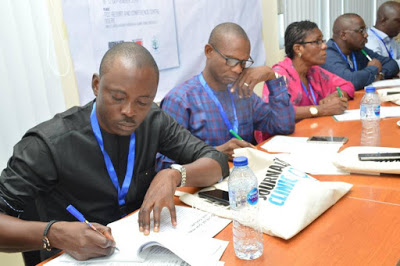establishes need for value-addition, profitability in media enterprise
editors-in-chief, editors and directors of print, broadcasting, online and
community media, and a select group of other media stakeholders, attended the 1st
Media Leaders’ Summit convened by The Journalism Clinic, from 16th – 17th September 2019 at the TCC Resort and
Conference Centre, Ogere-Remo, Ogun State.
The Nigerian Maritime Administration and Safety Agency
(NIMASA) sponsored some journalists and some of its staff for the programme.
Innovation Media Consulting Group based in London.
Founder/Director of The Journalism Clinic, Mr Taiwo Obe; Tara Agbakoba, legal
consultant, PwC and Oba Ayodele Kupoluyi, an ex-officio member of the Media
Independent Practitioners Association of Nigeria (MIPAN).
Plan for the Nigerian news media industry that:
media business, the principles and purpose of journalism remain largely the
same.
business survival and profitability. Therefore, news media operations must
strive to produce and deliver content that their audiences and consumers must
be willing to pay for.
revenue for the media. Media houses must build their brands such that they can
leverage them to generate revenue form sources such as events, festivals, book
publishing, merchandising, licensing, affiliate marketing and club membership.
reconfiguration of newsrooms to enhance workflow.
platforms – must be the primary destinations for their audiences and
communities because the money is where the article is viewed, watched and
touched. Platforms must not be allowed to make money off the operators’ talents
and initiatives.
develop the story through various techniques made possible by the internet and
digital technology to provide answers to questions the consumers want answers
to, such as the why, the how and what next.
media buyers now deploy data and scientific methods to decide where to place
their clients’ ads. Therefore, media owners must collectively work towards
providing sales and marketing information which are measurable and verifiable.
journalism and mass communication courses to review their curriculum to meet
the demands of the digital era.
Governance principles and ensure that their staff are promptly and adequately
remunerated.
healer of the society. Media organisations must therefore regularly drive
issues of public concern and significant social impact through campaigns or
crusade. Examples of the issues worth crusades are:
media should aid credible elections
can be done to reduce infant mortality
save indigenous languages from extinction
Nigerian oceans can be made safe
make Nigerian security agencies work for, and not against Nigerians.
and Conference Centre, 2019

